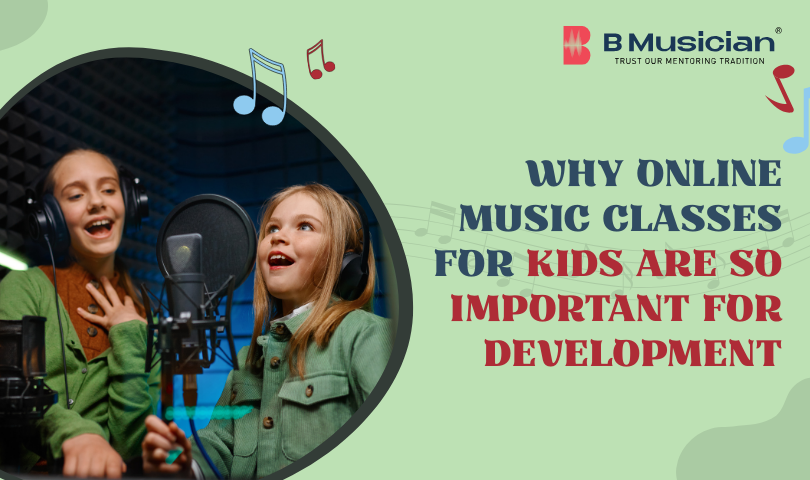Introduction
Music education during childhood represents one of the most powerful tools for comprehensive cognitive, emotional, and social development. Online music classes for kids have revolutionized access to quality musical instruction, making it possible for children worldwide to benefit from structured musical education regardless of geographical location or family circumstances. Modern research in neuroscience and child development consistently demonstrates that children who participate in regular online music lessons develop enhanced cognitive abilities, improved academic performance, stronger social skills, and greater emotional intelligence than their peers without musical training. Understanding the profound developmental benefits of online music classes helps parents make informed decisions about their children’s educational enrichment and long-term success.
The Science Behind Music and Child Development
Neurological Benefits of Musical Training
Research from leading universities demonstrates that online music lessons create measurable changes in children’s brain structure and function. Musical training enhances neural connectivity, particularly in language processing, mathematical reasoning, and spatial intelligence areas.
Critical Period Advantages
Children’s brains are remarkably plastic during developmental years, making online music courses especially effective when started early. This neuroplasticity allows musical training to have lasting positive effects on cognitive function and academic performance.
Multi-Sensory Learning Integration
Online music classes for kids engage multiple sensory systems simultaneously – auditory, visual, tactile, and kinesthetic – creating rich neural pathways that support learning across all academic subjects and life skills.
Executive Function Development
Musical training through online learning music lessons strengthens executive functions, including working memory, cognitive flexibility, and inhibitory control – skills essential for academic success and life management.
Cognitive Development Benefits
Enhanced Academic Performance
Mathematics and Logic
Children participating in online music classes consistently show improved mathematical abilities:
- Pattern Recognition: Musical patterns translate to mathematical concept understanding
- Fraction Comprehension: Note values provide a concrete fraction experience
- Spatial-Temporal Skills: Musical training enhances spatial reasoning abilities
- Problem-Solving: Musical challenges develop analytical thinking skills
Language and Literacy
Online music lessons provide significant language development advantages:
- Phonological Awareness: Musical training enhances sound discrimination abilities
- Vocabulary Expansion: Musical terminology enriches language development
- Reading Skills: Music reading supports literacy development through symbol recognition
- Communication: Musical expression enhances verbal and non-verbal communication
Memory and Concentration
Regular participation in online music courses strengthens cognitive abilities:
- Working Memory: Following musical instructions improves memory capacity
- Attention Span: Musical focus training extends concentration abilities
- Sequential Processing: Musical sequences enhance order and organization skills
- Multi-Tasking: Coordinating musical elements develops cognitive flexibility
Creative and Critical Thinking
Innovation and Creativity
Online music classes for kids foster creative development:
- Original Expression: Musical improvisation encourages creative thinking
- Problem-Solving: Musical challenges require innovative solutions
- Artistic Sensitivity: Exposure to beauty develops aesthetic appreciation
- Flexible Thinking: Musical interpretation requires adaptable thinking approaches
Analytical Skills
- Pattern Analysis: Musical forms develop analytical thinking abilities
- Comparison Skills: Studying different musical styles enhances comparison abilities
- Evaluation Skills: Musical criticism develops judgment and evaluation abilities
- Synthesis: Combining musical elements teaches integration and synthesis
Social and Emotional Development
Emotional Intelligence and Regulation
Emotional Expression
Online music lessons provide healthy outlets for emotional development:
- Feeling Recognition: Music helps children identify and name emotions
- Emotional Vocabulary: Musical expression expands emotional communication abilities
- Mood Regulation: Musical activities provide tools for emotional self-regulation
- Empathy Development: Musical storytelling enhances emotional understanding
Self-Confidence and Self-Esteem
- Achievement Recognition: Musical milestones build confidence and self-worth
- Public Performance: Opportunities to share music build courage and poise
- Personal Expression: Musical creativity validates individual voice and perspective
- Skill Mastery: Progressive musical learning builds a sense of competence
Social Skills and Collaboration
Communication Skills
Online music classes enhance social interaction abilities:
- Active Listening: Musical training develops attentive listening skills
- Turn-Taking: Musical ensemble work teaches cooperative interaction
- Non-Verbal Communication: Musical expression enhances body language awareness
- Cultural Appreciation: Exposure to diverse musical traditions builds cultural sensitivity
Teamwork and Cooperation
- Ensemble Playing: Group musical activities teach collaboration and coordination
- Leadership Skills: Musical leadership opportunities develop confidence and direction
- Peer Support: Musical learning communities create supportive relationships
- Conflict Resolution: Musical collaboration teaches compromise and problem-solving
Physical and Motor Development
Fine Motor Skills
Instrument-Specific Development
Different online music courses provide unique motor skill benefits:
- Piano: Finger independence, hand coordination, and bilateral motor control
- String Instruments: Fine motor precision, bow control, and finger dexterity
- Wind Instruments: Breath control, embouchure strength, and finger coordination
- Percussion: Hand-eye coordination, rhythmic precision, and ambidextrous development
Coordination and Balance
- Cross-Lateral Movement: Musical activities enhance brain hemisphere communication
- Timing and Rhythm: Musical training improves internal timing and body awareness
- Spatial Awareness: Musical instrument positioning develops spatial intelligence
- Physical Discipline: Musical practice teaches body control and postural awareness
Health and Wellness Benefits
Physical Health
Online music classes for kids support overall physical development:
- Respiratory Development: Wind instrument training strengthens breathing capacity
- Posture Improvement: Proper musical posture supports healthy physical development
- Stress Reduction: Musical activities provide healthy stress relief and relaxation
- Immune System Support: Reduced stress and increased joy support immune function
Mental Health
- Anxiety Reduction: Musical activities provide calming and centering experiences
- Depression Prevention: Musical achievement and expression support mental wellness
- Self-Regulation: Musical training provides tools for emotional self-management
- Resilience Building: Musical challenges teach persistence and bounce-back abilities
Cultural and Character Development
Cultural Awareness and Appreciation
Global Perspective
Online learning music lessons expose children to diverse cultural traditions:
- World Music Exposure: Learning about different musical traditions broadens perspective
- Historical Understanding: Musical history provides context for cultural development
- Language Appreciation: Musical exposure to different languages enhances linguistic awareness
- Cultural Respect: Learning diverse musical traditions teaches appreciation for differences
Heritage Connection
- Family Tradition: Musical learning can connect children to their family’s cultural background
- Identity Development: Cultural musical participation supports identity formation
- Community Connection: Musical participation creates bonds with cultural communities
- Intergenerational Sharing: Music provides bridges between different generations
Character and Values Development
Discipline and Persistence
Online music classes teach essential life skills:
- Practice Habits: Regular musical practice develops discipline and routine
- Goal Setting: Musical objectives teach planning and achievement strategies
- Delayed Gratification: Musical progress teaches patience and persistence
- Work Ethic: Musical improvement requires consistent effort and dedication
Responsibility and Commitment
- Instrument Care: Learning to maintain instruments teaches responsibility
- Schedule Management: Music lessons teach time management and priority setting
- Follow-Through: Musical commitments teach reliability and dependability
- Quality Standards: Musical excellence teaches attention to detail and high standards
Why BMusician Excels in Online Music Classes for Kids
Child-Centered Curriculum Design
BMusician’s online music lessons are specifically designed to address children’s developmental needs, learning styles, and attention spans. The curriculum incorporates child development principles while maintaining high musical education standards.
Expert Child Music Educators
The platform features accomplished musicians who specialize in childhood music education and understand how to engage young learners through online platforms effectively. These instructors combine musical expertise with proven pedagogical methods adapted for digital learning environments.
Age-Appropriate Learning Technology
Kid-Friendly Platform Features:
- Interactive Visual Elements: Colorful, engaging interfaces that capture and maintain children’s attention
- Game-Based Learning: Musical concepts taught through fun, interactive games and activities
- Progress Visualization: Child-friendly progress tracking that celebrates achievements and milestones
- Parental Integration: Tools that allow parents to support and monitor their children’s musical development
Comprehensive Developmental Approach
Holistic Musical Education:
- Multiple Intelligence Integration: Curriculum that addresses various learning styles and intelligences
- Character Development: Musical instruction that emphasizes values, discipline, and personal growth
- Academic Reinforcement: Musical concepts that support and enhance traditional academic learning
- Creative Expression: Opportunities for children to explore and develop their unique musical voices
BMusician’s Child-Focused Course Structure
Early Childhood (Ages 3-6): Foundation Building
Musical Exploration and Discovery
- Sound Exploration: Basic introduction to musical sounds, rhythms, and melodies
- Movement Integration: Combining music with physical movement for comprehensive learning
- Story-Based Learning: Musical concepts taught through engaging stories and characters
- Family Participation: Programs designed to include parent and sibling involvement
Developmental Focus Areas:
- Language Development: Musical activities that support vocabulary and communication growth
- Motor Skills: Activities that develop both fine and gross motor coordination
- Social Skills: Group activities that teach sharing, cooperation, and turn-taking
- Emotional Expression: Musical opportunities for children to express feelings and emotions
Elementary Age (Ages 7-11): Skill Development
Structured Musical Learning
- Instrument Introduction: Systematic introduction to various musical instruments
- Music Reading: Age-appropriate music notation and rhythm reading
- Ensemble Participation: Virtual group activities that teach collaboration and listening
- Cultural Exploration: Introduction to musical traditions from around the world
Academic Integration:
- Mathematics Connection: Musical concepts that reinforce mathematical learning
- Science Integration: Understanding sound, vibration, and acoustic principles
- History and Culture: Musical traditions that enhance social studies understanding
- Language Arts: Musical activities that support reading, writing, and communication
Pre-Teen (Ages 12-14): Advanced Development
Specialized Musical Training
- Advanced Technique: More sophisticated musical skills and instrument mastery
- Music Theory: Comprehensive understanding of musical structure and composition
- Performance Skills: Preparation for recitals, competitions, and public performances
- Creative Composition: Opportunities to create original musical works
Leadership and Independence:
- Peer Teaching: Opportunities to help younger students and develop leadership
- Self-Directed Learning: Increasing independence in practice and musical exploration
- Goal Setting: Advanced goal-setting and achievement strategies
- Career Exploration: Introduction to musical career possibilities and pathways
Online Classical Music Classes and Traditional Training
Benefits of Classical Music Education
Foundational Skills
Online classical music classes provide exceptional developmental benefits:
- Technical Excellence: Classical training develops superior technical precision and control
- Historical Understanding: Classical music education offers a cultural and historical context
- Discipline and Focus: Classical music requires exceptional attention and concentration
- Artistic Sensitivity: Classical music develops refined aesthetic judgment and appreciation
Cognitive Enhancement
- Complex Pattern Recognition: Classical music structures develop advanced analytical abilities
- Memory Development: Memorizing classical pieces enhances cognitive function
- Attention to Detail: Classical music requires precision that develops meticulous attention
- Sequential Processing: Classical forms enhance understanding of logical progression
Integration with Contemporary Styles
Balanced Musical Education BMusician’s approach combines classical foundations with contemporary relevance:
- Technical Foundation: Classical training provides technical skills applicable to all styles
- Cultural Appreciation: Classical education develops sophisticated musical understanding
- Creative Application: Classical skills enhance creativity in contemporary musical expression
- Versatile Musicianship: Classical training creates well-rounded musical abilities
Addressing Common Concerns About Online Music Classes for Kids
Attention and Engagement
Interactive Learning Solutions
Modern online music courses address attention challenges through:
- Varied Activity Types: Multiple activity formats prevent boredom and maintain engagement
- Short Lesson Segments: Age-appropriate lesson lengths that match attention spans
- Visual and Auditory Stimulation: Multi-sensory engagement that captures children’s interest
- Immediate Feedback: Quick response and reward systems that maintain motivation
Parental Support Integration
- Practice Guidance: Resources for parents to support effective home practice
- Progress Communication: Regular updates on children’s development and achievements
- Home Environment: Guidance on creating supportive musical learning environments
- Family Involvement: Opportunities for family members to participate in musical activities
Social Interaction and Community
Virtual Musical Communities
Online music classes for kids create social connections through:
- Virtual Ensembles: Group musical activities that foster collaboration and friendship
- Peer Interaction: Opportunities for children to interact with musical peers
- Performance Sharing: Platforms for children to share achievements with others
- Community Events: Virtual recitals, masterclasses, and musical celebrations
Getting Started with Online Music Classes for Your Child
Choosing Age-Appropriate Programs
Assessment and Selection
- Developmental Stage: Matching musical programs to children’s developmental needs
- Interest Areas: Identifying children’s musical preferences and natural inclinations
- Learning Style: Selecting programs that match children’s individual learning preferences
- Family Goals: Aligning musical education with family values and objectives
Program Evaluation Criteria
- Instructor Qualifications: Ensuring teachers have both musical expertise and child development knowledge
- Curriculum Structure: Evaluating progression and developmental appropriateness
- Technology Requirements: Ensuring family technology capacity matches program needs
- Support Systems: Availability of parent resources and communication channels
Creating Supportive Home Environments
Physical Space Setup
- Dedicated Practice Area: Creating consistent, distraction-free learning spaces
- Instrument Access: Providing appropriate instruments and equipment for home practice
- Technology Setup: Ensuring reliable internet and device access for online learning
- Family Integration: Incorporating musical learning into daily family routines
Emotional and Social Support
- Encouragement and Patience: Providing supportive responses to musical learning challenges
- Celebration of Progress: Recognizing and celebrating musical achievements and milestones
- Family Musical Activities: Incorporating music into family life and activities
- Community Connection: Connecting with other musical families and communities
Invest in Your Child’s Future with BMusician Today
Unlock Your Child’s Developmental Potential
Don’t let another day pass without providing your child with the developmental advantages of musical education. BMusician’s online music classes for kids are specifically designed to maximize cognitive, emotional, social, and physical development while making musical learning enjoyable and engaging.
Why Choose BMusician for Your Child’s Musical Education
- Child Development Expertise: Curriculum designed by experts in both music education and child development
- Age-Appropriate Technology: Interactive, engaging platforms specifically created for young learners
- Comprehensive Benefits: Programs that address cognitive, emotional, social, and physical development
- Expert Child Educators: Instructors who specialize in teaching children through online platforms
- Family Support: Resources and guidance for parents to support their children’s musical journey
- Cultural Integration: Programs that honor diverse musical traditions while building universal skills
Frequently Asked Questions (FAQs)
Q: At what age should children start online music classes for kids?
A: Children can begin musical activities as early as age 3, with formal instruction typically starting around age 4-6. BMusician offers age-appropriate programs for different developmental stages, ensuring that musical education matches children’s cognitive and physical development levels.
Q: Can online music lessons provide the same developmental benefits as in-person instruction?
A: Yes! Modern online music classes use interactive technology, engaging visual elements, and expert instruction to provide comprehensive developmental benefits. The key is choosing programs specifically designed for children’s online learning needs, like those offered by BMusician.
Q: How do online music courses help with academic performance?
A: Online music classes enhance academic performance through improved cognitive function, better memory, enhanced pattern recognition, and stronger concentration abilities. Musical training supports learning mathematics, language arts, and science through skill transfer and brain development.
Q: What role should parents play in their child’s online music education?
A: Parents play crucial supportive roles, including creating practice environments, encouraging consistent practice, celebrating achievements, and participating in musical activities when appropriate. BMusician provides resources and guidance for effective parental involvement.
Q: How do online learning music lessons address social development needs?
A: Quality online music programs include virtual ensemble opportunities, peer interaction, performance sharing, and community events that foster social skills’ development. Through structured online musical activities, children learn collaboration, communication, and cultural appreciation.


















